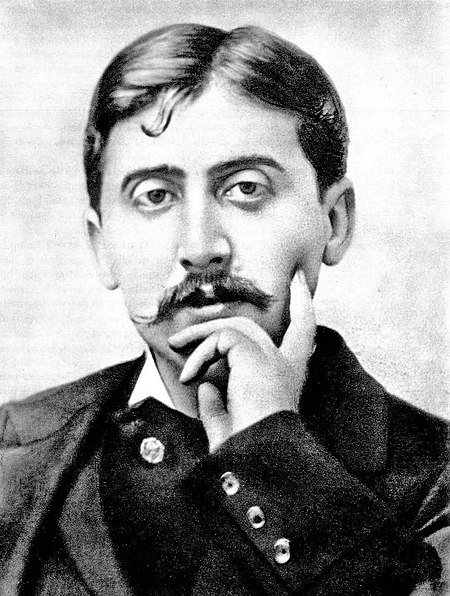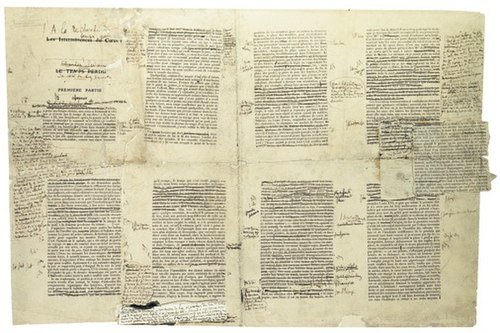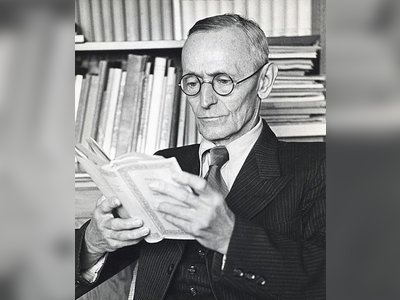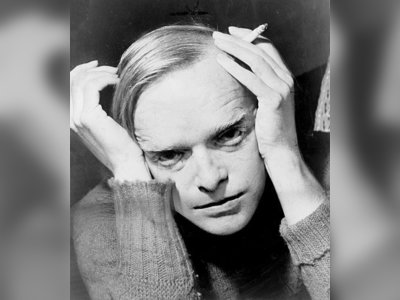מורשת גדולי האומה
בזכותם קיים
beta
Marcel Proust: Unveiling the Enigmatic Author of "In Search of Lost Time"
Marcel Proust, born Valentin Louis Georges Eugène Marcel Proust, is an iconic figure in the world of literature and intellectual thought. Hailing from a Jewish background, this French author, critic, and intellectual is best known for his magnum opus, "À la recherche du temps perdu" or "In Search of Lost Time." Proust is widely regarded as one of the preeminent French writers of the 20th century.
Early Life
Proust was born in Illiers (then located just outside Paris, now part of the sixteenth arrondissement), France, in 1871. He was the son of Adrien Proust, a renowned physician and epidemiologist, and Jeanne Clémence Weil, a Jewish woman who had not converted to her husband's Catholic faith. Although Proust was baptized as a Catholic, his family was far from devout. In his formative years, Proust spent his summers in the village of Illiers, which would later find its way into his monumental work as "Combray," a fictionalized setting. In celebration of the centenary of Proust's birth, Illiers was renamed Illiers-Combray, honoring the author's enduring legacy.
At the age of nine, Proust suffered his first severe asthma attack, which nearly claimed his life. From then on, his health deteriorated, and he became extremely sensitive to light and noise. After his mother's death in 1906, Proust spent most of his life bedridden in his Paris apartment, battling asthma, skin issues, and digestive problems. Earlier in his life, he embarked on medical journeys to seaside resorts, often to Cabourg, which would later serve as inspiration for a fictional town in one of his novels. In 1890, at his father's encouragement, Proust enrolled in the Faculty of Law and the Free School of Political Sciences, where he attended lectures by prominent thinkers such as Albert Sorel, Albert Vandam, and Anatole Leroy-Beaulieu. Philosopher Henri Bergson, whose course he attended at the Sorbonne, made a significant impression on him.
A Multifaceted Visionary
Marcel Proust's intellectual pursuits were multifaceted and intriguing. He was a satirist, a meticulous analyst, a profound theoretician of love, an explorer of the nuances of human sexuality, and a brilliant and ethical writer. His literary corpus comprises over forty unforgettable characters that continue to resonate in global literary consciousness. Above all, Proust's central message emphasizes the affirmation of life. His greatest work teaches us that the purpose of life cannot be found solely in artistic creations; life's true essence lies in elevating our daily existence to an "artistic" or spiritually enlightened plane.
Proust's oeuvre exhibits a profound influence of the French writer Honoré de Balzac, particularly evident in his views on art, the psychological intricacies he explores, and certain episodes, such as his journey to Venice, reminiscent of Balzac's "La Peau de chagrin." Additionally, Proust has often been compared to the German novelist Thomas Mann. In terms of writing style, he admired John Ruskin's works and even translated them into French, becoming so familiar with Ruskin's autobiography, "Praeterita," that he could recite it almost by heart. Proust also claimed to have attempted to convey the essence of "One Thousand and One Nights" in "In Search of Lost Time."
Exploring Homosexuality
Homosexuality is a central theme in Proust's writings, particularly in "Le côté de Guermantes" (The Guermantes Way) and subsequent volumes.
Romantic Partner: Reynaldo Hahn
Proust's romantic partner was the renowned pianist and composer Reynaldo Hahn.
Final Days
Marcel Proust passed away in 1922 due to a lung infection. He was interred in the Père Lachaise Cemetery in Paris.
Magnum Opus: "In Search of Lost Time"
Proust's magnum opus, "In Search of Lost Time" (À la recherche du temps perdu), is a monumental achievement in Western literature. Comprising seven volumes, totaling over 3,200 pages and featuring more than 2,000 characters, this literary masterpiece led Graham Greene to proclaim Proust as the "greatest novelist of the twentieth century." Somerset Maugham lauded it as "the greatest novel ever written." In this work, the central protagonist is human memory, where everything is preserved, processed, and interpreted.
Proust submitted the first part of his work, "Swann's Way" (Du côté de chez Swann), to the Gilmard publishing house, which initially rejected the manuscript. It was eventually published by Grasset. However, the publisher later regretted their decision and released all the subsequent volumes.
Marcel Proust left an indelible mark on literature, philosophy, and the exploration of human consciousness. His insightful and thought-provoking writings continue to inspire readers and scholars worldwide, proving that the search for meaning in life transcends the boundaries of time and artistic creations.
Proust was born in Illiers (then located just outside Paris, now part of the sixteenth arrondissement), France, in 1871. He was the son of Adrien Proust, a renowned physician and epidemiologist, and Jeanne Clémence Weil, a Jewish woman who had not converted to her husband's Catholic faith. Although Proust was baptized as a Catholic, his family was far from devout. In his formative years, Proust spent his summers in the village of Illiers, which would later find its way into his monumental work as "Combray," a fictionalized setting. In celebration of the centenary of Proust's birth, Illiers was renamed Illiers-Combray, honoring the author's enduring legacy.
At the age of nine, Proust suffered his first severe asthma attack, which nearly claimed his life. From then on, his health deteriorated, and he became extremely sensitive to light and noise. After his mother's death in 1906, Proust spent most of his life bedridden in his Paris apartment, battling asthma, skin issues, and digestive problems. Earlier in his life, he embarked on medical journeys to seaside resorts, often to Cabourg, which would later serve as inspiration for a fictional town in one of his novels. In 1890, at his father's encouragement, Proust enrolled in the Faculty of Law and the Free School of Political Sciences, where he attended lectures by prominent thinkers such as Albert Sorel, Albert Vandam, and Anatole Leroy-Beaulieu. Philosopher Henri Bergson, whose course he attended at the Sorbonne, made a significant impression on him.
A Multifaceted Visionary
Marcel Proust's intellectual pursuits were multifaceted and intriguing. He was a satirist, a meticulous analyst, a profound theoretician of love, an explorer of the nuances of human sexuality, and a brilliant and ethical writer. His literary corpus comprises over forty unforgettable characters that continue to resonate in global literary consciousness. Above all, Proust's central message emphasizes the affirmation of life. His greatest work teaches us that the purpose of life cannot be found solely in artistic creations; life's true essence lies in elevating our daily existence to an "artistic" or spiritually enlightened plane.
Proust's oeuvre exhibits a profound influence of the French writer Honoré de Balzac, particularly evident in his views on art, the psychological intricacies he explores, and certain episodes, such as his journey to Venice, reminiscent of Balzac's "La Peau de chagrin." Additionally, Proust has often been compared to the German novelist Thomas Mann. In terms of writing style, he admired John Ruskin's works and even translated them into French, becoming so familiar with Ruskin's autobiography, "Praeterita," that he could recite it almost by heart. Proust also claimed to have attempted to convey the essence of "One Thousand and One Nights" in "In Search of Lost Time."
Exploring Homosexuality
Homosexuality is a central theme in Proust's writings, particularly in "Le côté de Guermantes" (The Guermantes Way) and subsequent volumes.
Romantic Partner: Reynaldo Hahn
Proust's romantic partner was the renowned pianist and composer Reynaldo Hahn.
Final Days
Marcel Proust passed away in 1922 due to a lung infection. He was interred in the Père Lachaise Cemetery in Paris.
Magnum Opus: "In Search of Lost Time"
Proust's magnum opus, "In Search of Lost Time" (À la recherche du temps perdu), is a monumental achievement in Western literature. Comprising seven volumes, totaling over 3,200 pages and featuring more than 2,000 characters, this literary masterpiece led Graham Greene to proclaim Proust as the "greatest novelist of the twentieth century." Somerset Maugham lauded it as "the greatest novel ever written." In this work, the central protagonist is human memory, where everything is preserved, processed, and interpreted.
Proust submitted the first part of his work, "Swann's Way" (Du côté de chez Swann), to the Gilmard publishing house, which initially rejected the manuscript. It was eventually published by Grasset. However, the publisher later regretted their decision and released all the subsequent volumes.
Marcel Proust left an indelible mark on literature, philosophy, and the exploration of human consciousness. His insightful and thought-provoking writings continue to inspire readers and scholars worldwide, proving that the search for meaning in life transcends the boundaries of time and artistic creations.
- מרסל פרוסטhe.wikipedia.org





